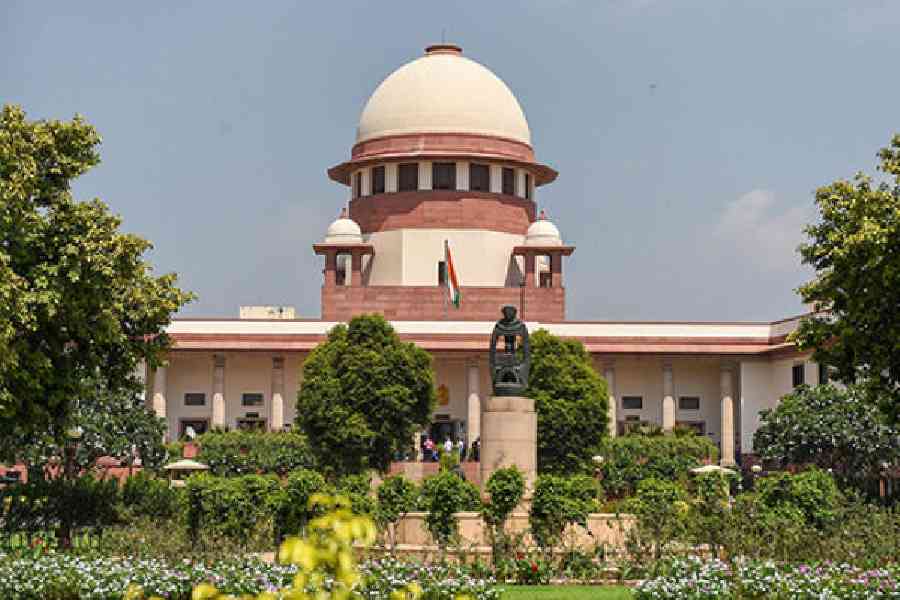A split Supreme Court recalled one of its own judgments by 2:1 majority on Tuesday to allow “post facto” environmental clearance to infrastructure projects, ruling that demolishing errant structures would amount to “throwing the valuable public resources in dustbin”.
Chief Justice of India B.R. Gavai and Justice K. Vinod Chandran passed the majority verdict, boosting the Centre and various real estate giants. But Justice Ujjwal Bhuyan’s dissenting judgment scathingly observed that “the deadly Delhi smog reminds us every day about the hazards of environmental pollution”.
Justice Bhuyan was part of a two-judge bench headed by (since retired) Justice A.S. Oka that had passed the now-recalled May 16 verdict against a 2017 central government notification allowing retrospective environment clearances (ECs).
Tuesday’s majority judgment upheld review petitions moved by a developers’ group, a central PSU and a state government against the May 16 verdict. Review petitions have historically had less than 0.1 per cent success at the top court.
Critics argued that retrospective approvals — even if they came with stiff penalties, as emphasised by the apex court — amounted to encouraging and regularising law violations.
Justice Gavai, who authored the main judgment, referred to several earlier Supreme Court judgments.
“I am in complete agreement with the aforesaid observations of this court in the case of Bindu Kapurea… that demolition of the projects already completed would rather than being in public interest would result in throwing the valuable public resources in dustbin,” he said.
“In any case, both the 2017 Notification and 2021 OM (office memorandum) provide for imposition of huge penalties… (which) have a deterrent effect and the same takes care of heavily penalising the errant builder/ developer while allowing operation of several projects which are otherwise permissible in law.”
Justice Gavai said that not recalling the (May 16) judgment would “have serious consequences in terms of demolition of projects which are either completed or about to be completed in the near future and which are of vital public importance (and have been) constructed out of the public exchequer”.
Justice Chandran, in his separate but concurring judgment, said: “I fully concur… and find the review to be not only warranted, but imperative and expedient.”
Environmentalists argue that the 2017 notification runs counter to Sections 6 and 25 of the Environment Protection Act and the Environment Impact Assessment (EIA) 2006 Rules formulated by the central government.
These prohibit or restrict certain industries, processes and operations in specific areas. Crucially, they make environmental clearance mandatory before a project starts.
Justice Bhuyan’s dissenting judgment dismissed the review petitions and said: “Not only it is the fundamental duty of every citizen to protect the environment under Article 51A(g) of the Constitution of India, (the) right to have asafe environment is now a facet of Article 21 (right to life and liberty).
“This court through its repeated judicial interventions has declared that (the) rightto clean air and a pollution-free environment is a fundamental right….”
Justice Bhuyan said the grant of retrospective environment clearances went against environmental jurisprudence, including EIA notifications from 1994 and 2006.
“I would like to painfully observe that the deadly Delhi smog reminds us every day about the hazards of environmental pollution,” he said.
Justice Bhuyan said the Supreme had the “duty and obligation” to “safeguard the environment”.
“It cannot be seen backtracking on the sound environmental jurisprudence that has evolved in this country, that, too, on a review petition filed by persons who have shown scant regard for the rule of law,” he said.
In an X post, Congress communications head Jairam Ramesh termed the majority verdict “disappointing”.
“Retrospective environmental clearances are sought deliberately by companies who are well aware of the laws but still violate them knowingly with a ‘baadme dekha jayega’ attitude,” he wrote.
“This decision of the Chief Justice is doubly disappointing since just yesterday he had directed the Uttarakhand Govt to restore and repair ecological damage at the Corbett Tiger Reserve caused by illegal tree felling and unauthorised construction.
“In addition, last week he had issued an order banning all mining activity within a kilometre of any national park or wildlife sanctuary.
“The Chief Justice had also put on hold the Rajasthan Govt’s proposal to redraw the boundaries of the Sariska Tiger Reserve and had directed the Jharkhand Govt to declare two rich forest areas as wildlife sanctuaries after fulfilling the provisions of the Forest Rights Act, 2006.
“Retrospective approvals with penalties howsoever heavy is no solution. It only regularises the by-passingof laws.”
Scientists have said the recent spate of deadly landslides and flash floods in Uttarakhand are the resultof runaway infrastructure-building without regard for the environment.
The May 16 judgment had come on a public interest petition moved by the NGO Vanshakti against the 2017 government notification.
The review petitions were moved by the Confederation of Real Estate Developers of India (Credai), Steel Authority of India Limited, and the Karnataka government.











